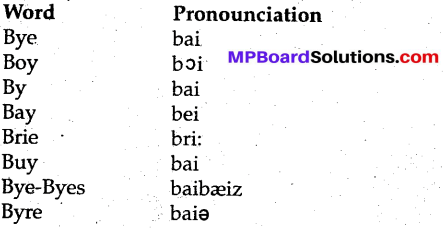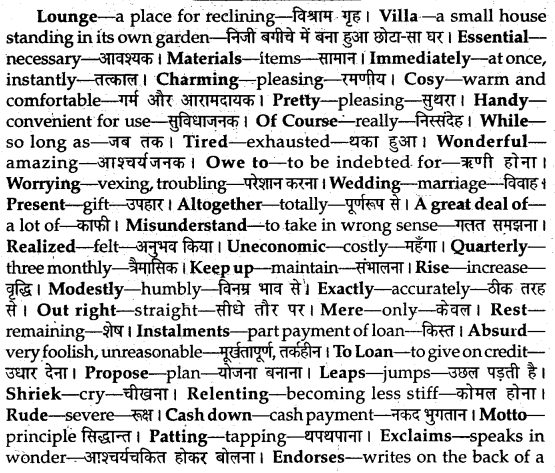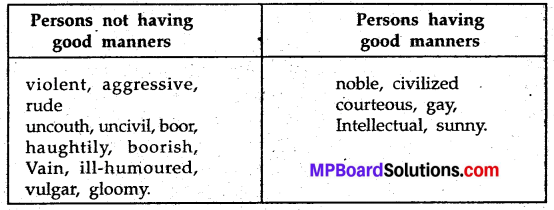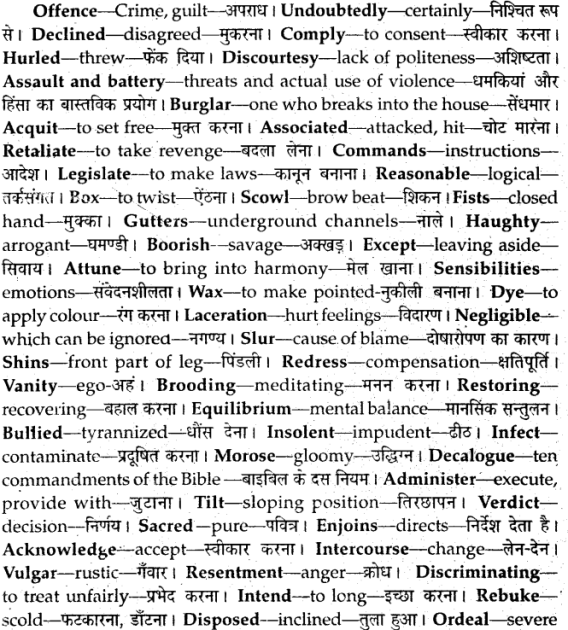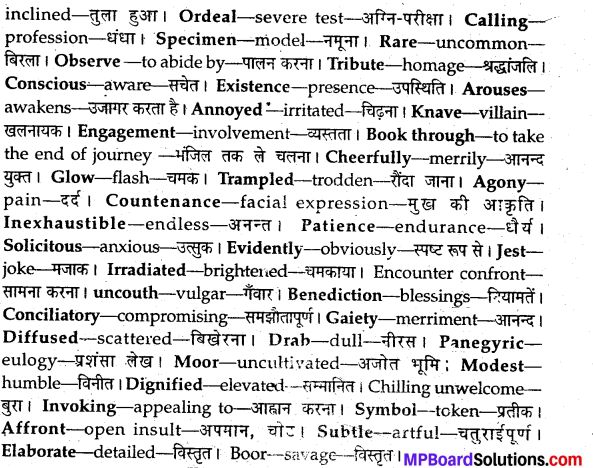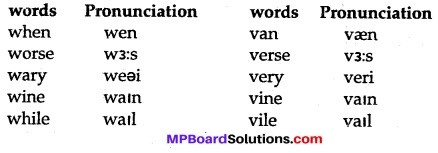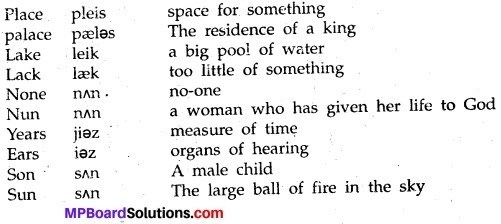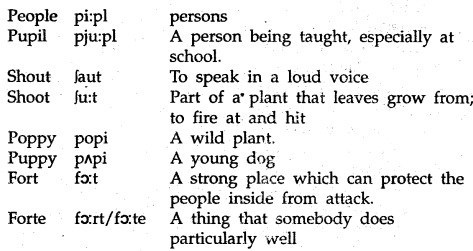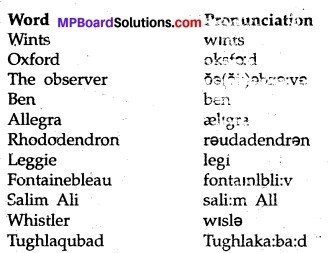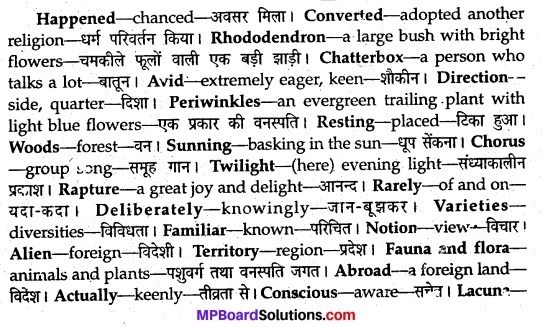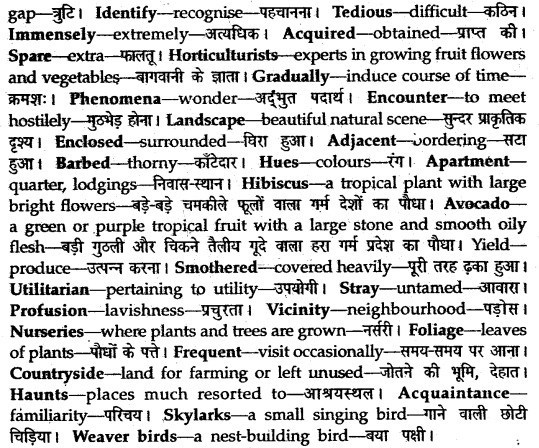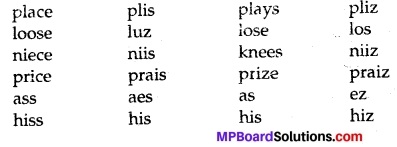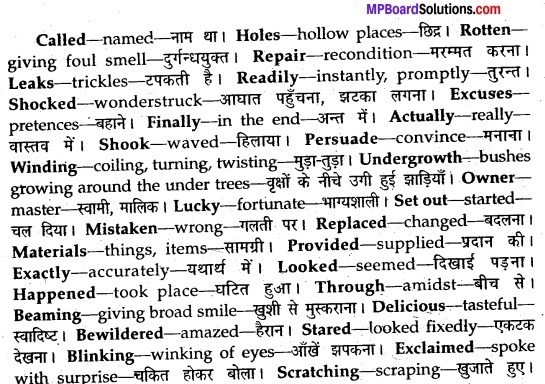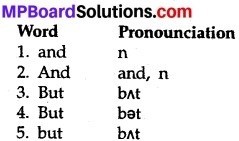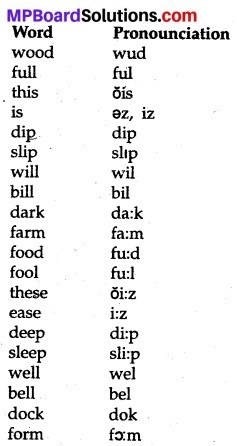MP Board Solutions for Class 9 English The Rainbow Workbook Solutions Chapter 3 Little Girls Wiser than Men Questions and Answers aids you to prepare all topics in it effectively. You need not worry about accuracy of Madhya Pradesh State Board Solutions for Class 9 English Chapter 3 Little Girls Wiser than Men as they are given adhering to the latest exam pattern and syllabus guidelines. You Can Download MP Board Class 9 English Solutions Questions and Answers, Notes, Summary, Guide pdf on is page. Enhance your subject knowledge by preparing from Chapterwise MP Board Solutions for Class 9 English and clarify your doubts on corresponding topics.
MP Board Class 9th English The Rainbow Workbook Solutions Chapter 3 Little Girls Wiser than Men
Kick start your preparation by using our online resource Madhya Pradesh State Board Solutions for Class 9 English The Rainbow Workbook Solutions Chapter 3 Little Girls Wiser than Men. You can even download MP Board Solutions for Class 9 English free of cost rough direct links available on our page. Clear your queries and understand concept behind in a simple manner. Simply tap on concept you wish to prepare chapterwise and go rough it.
Little Girls Wiser than Men Vocabulary and Pronunciation
A. Choose the appropriate alternatives to complete the sentences given below.
Question 1.
A ……………….. is a means of transport which slides over the snow on wooden or metal runners.
(a) wagon
(b) cart
(c) sledge
(d) carriage
Question 2.
Please take ……………. your shoes.
(a) off
(b) out
(c) over
(d) up
Question 3.
The men came ………….. and a crowd collected in the street.
(a) off
(b) in
(c) out
(d) on
Question 4.
The men came ……………… at the little girls, and were ashamed, and laughing at themselves, went back each to his own home.
(a) looked
(b) saw
(c) watched
(d) observed
B. Write different meanings of the word ‘colour’ and use them in sentences of your own.
- The appearance—that things have that results from the way in which they reflect light—what is your favourite colour.
- Shade—a particular form of a colour- sky blue is a shade of blue.
- Hue—a colour or a particular shade of a colour—His face took on an unhealthy, whitish hue.
- Tint—a shade or small amount of a particulars colour— These are leaves with red and gold autumn tints.
- Tinge—a small amount of a colour—There was a pink tinge to the sky.
C. Write meanings of the following compound words :
(a) homespun ………………….. homemade …………………..
(b) homesick ………………….. homeward …………………..
(c) homegrown ………………….. homecoming …………………..
(d) homestead ………………….. hometown …………………..
Answer:
(a) (of cloth) made at home, made at home
(b) sad because out is away from home and miss his family, going towards home.
(c) (of plants, fruit and vegetables) grown in a person’s garden,the act of returning to home.
(d) a house with the land and buildings around it, the place where you were born or lived as child.
D. A limited number of words change their stress pattern according to their grammatical function.
Example : ‘object (noun) ob’ject (verb)
Select five such words and pronounce them.
Answer:
- ‘present – prese’nt
- ‘absent – abse’nt
- ‘advice – advi’se
Listening Skill
A. Listen to the conversation on telephone between Mr Raman , and Monu. Mr. Raman comes from some other city and wants to talk to his friend.
See workbook page 19-20.
Now, complete the following sentences on the basis of the above talk.
(i) Raman talked to
(ii) Monu’s father name was
(iii) He had gone on a
(iv) He was going to return within
(v) Mr. Sharma’s friend was from
If we don’t understand something, what should we say to the speaker so that he may repeat his words.
Answer:
(i) Monu
(ii) Mr. Sharma
(iii) Morning walk
(iv) Ten minutes
(v) Tarantaran.
B. Listen to the expressions given on the flags. Pay attention to the tone and stress.
See workbook page 20.
Speaking Skill
A. There are some situations where we need to react immediately. Quick responses help us a lot; match the questions and the responses. Divide the class into two groups. Group ‘A’ will ask questions and group ‘B’ will respond.
| A | B | |
| 1. How many shirts do you have? | a. | Yes, I do. |
| 2. Who’s your best friend? | b. | No, I’m an Indian. |
| 3. Do you like oranges ? | c. | No, thank you. |
| 4. Why are you going to market ? | d. | Yes of course, what can I do for you? |
| 5. Whose book is this ? | e. | Vinod |
| 6. Would you like anything else? | f. | I have three. |
| 7. How much did your shirt cost? | g | To buy some fruits. |
| 8. Are you a French ? | h. | It’s mine. |
| 9. Where are you going on Sunday? | i. | One hundred rupees |
| 10. Could you help me, please? | j. | To Khandwa. |
Answer:
1. f, 2. e, 3. a, 4. g, 5. h, 6. c, 7. i, 8. b, 9. j, 10. d.
Reading Skill
Read the given passage arid answer the questions given below it.
See workbook page 21-22.
Question 1.
On the basis of your reading of the above passage, complete the following statements.
(i) The local people were “replaced by
Answer:
the slave-labourers from Africa.
(ii) The major problem of Jamaica was that of
Answer:
social discrimination
(iii) The writer became very sad to notice that
Answer:
the two little boys were also taken up with the thought 1 of racial discrimination.
(iv) The white man then smiled and said
Answer:
that the two boys were brothers and they were his sons.
Question 2.
Answer the following questions briefly.
(i) What amazed the author when he saw the little boys playing?
Answer:
One boy was white and the other was brown. The brown boy was commanding the white boy.
(ii) The author thought that the brown boy was a servant in the family of the white boy, why did he discard idea later.
Answer:
Soon he discarded the idea as both boys were wearing same ; kind of cloths.
Question 3.
Pick out words from the passage which have the following meanings :
(i) People of different races being treated less fairly than others.
(ii) Put aside / we didn’t want or need.
(iii) Anything that happens or any unpleasant happening.
(iv) Calm and not anxious or worried.
Answer:
(i) Slaves
(ii) Discard
(iii) Incident
(iv) Relaxed.
Language Practice (Grammar)
A. Study the following sentences.
See workbook page 23.
Now, write questions with how long.
Example : Lata is learning Sanskrit? How long has she been learning Sanskrit?
(i) It is raining.
(ii) Ravi plays cricket.
(iii) I live in Indore.
(iv) He studies maths.
Answer:
(i) How long has it been raining?
(ii) How long has Ravi been playing cricket?
(iii) How long have I been living in indore?
(iv) How long has he been studing maths
Complete the sentences using since or for.
(i) I have known Rakesh …………. five years.
(ii) He has wanted to study physics ……….. he was a child.
(iii) They have been waiting for us ………………. half an hour.
(iv) Sohan has been working in Mumbai …………. February.
Answer:
(i) for
(ii) since
(iii) for
(iv) since.
B. Study these sentences.
See workbook page 24.
Rephrase the following sentences, using the present perfect tense.
Example :
- I last read a newspaper on June 2006.
- I haven’t read a newspaper since then.
- It is two years since I saw Pankaj.
- I haven’t seen Pankaj for the last two years
Question 1.
It is two months since he earned any money.
Answer:
He hasn’t earned any money since then.
Question 2.
I saw Yash last on his wedding day.
Answer:
I haven’t seen Yash once then.
Question 3.
He last paid his taxes in the year 2000.
Answer:
He hasn’t paid taxes since then.
Question 4.
I last went on a tour five years ago.
Answer:
I haven’t gone on a tour since there
Question 5.
She last watched TV on New year’s day.
Answer:
She hasn’t watched TV since then.
Put the verbs in brackets into the future tense and rewrite the sentences.
Question 1.
I hope they (repair) this road by the time we come back next summer.
Answer:
I hope they would have repaired this road by the time we come back next summer.
Question 2.
By the end of any tour I (give exactly the same lecture 10 times.
Answer:
By the end of any tour i would have given exactly the same lecture 10 times.
Question 3.
When he reaches Ujjain he (walk) 5 kilometres.
Answer:
When he reaches Ujjain he would have walked 5 kilometres.
Question 4.
By the end of the week two hundred students (admit) in school.
Answer:
By the end of the week two hundred student would have admitted in school.
Question 5.
By the end of next week my brother (complete) his exercise.
Answer:
By the end of next week my brother would have completed his exercise.
C. Study these pairs of sentences.
See work book page 25-27.
A. Fill in the blanks with suitable pronouns.
1. The teacher has sent the book for you and ………….. (personal pronoun)
2. It was …………. who” took away the books, (personal pronoun)
3. Please mark the mistakes and I will correct ………… (demonstrative pronoun)
4. That is the man ……….. shop was inagurated last week, (relative pronoun)
5. My car is an Austin ……………. is a Ford, (relative pronoun)
Answer:
- him.
- he
- those
- whose
- that
- who
- who.
Join the following sentences with suitable relative pronouns, (who, which, that )
Question 1.
My sister has come to India. She lives in London.
Answer:
My sister who lives in London has come to India.
Question 2.
These are the fruits. My brother bought them.
Answer:
These are the fruits that my brother sought them.
Question 3.
Here is the box? I keep my money in it.
Answer:
Here is the box in which I keep my money.
Question 4.
He told us a story. It was Very interesting.
Answer:
He’told us a story which, was very interesting.
Question 5.
I. listened to a drama. It was broadcast last night.
Answer:
I listened to a drama that was broadcast last night.
Question 6.
The gate broke in the night. Its hinges were weak.
Answer:
The gate which hinges were broke in tire night.
Writing Skill
Complete the flow chart narrating the sequence of incident from ‘Little girls wiser than men.’
- Malasha and Akouiya meet in a lane.
- They took to splashing about in the water.
- They removed their shoes and stockings.
- Malasha plumped down foot in the water.
- .Akouiya strick Malasha. They began quarreling.
- The man start shouting and the affairs came to blow.
We believe the information shared regarding MP Board Solutions for Class 9 English The Rainbow Workbook Solutions Chapter 3 Little Girls Wiser than Men Questions and Answers as far as our knowledge is concerned is true and reliable. In case of any queries or suggestions do leave us your feedback and our team will guide you at soonest possibility. Bookmark our site to avail latest updates on several state board Solutions at your fingertips.

